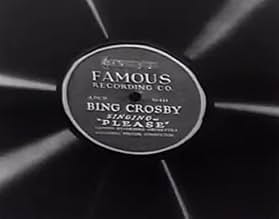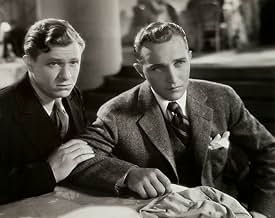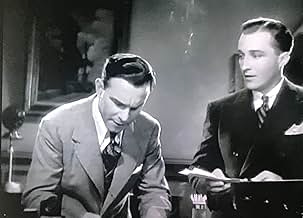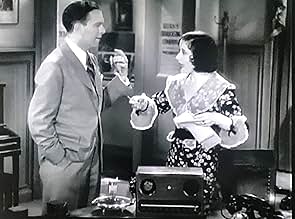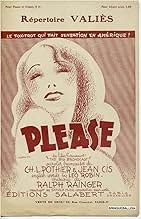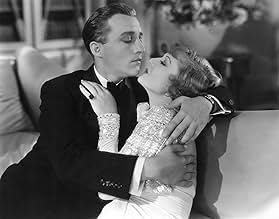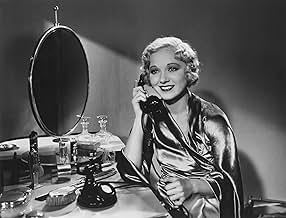Agrega una trama en tu idiomaA radio-singer, Bing Crosby, is none-too-concerned about his job, and an affair with Mona leads to his dismissal. When it appears Hornsby is getting and paying a lot of attention to his fian... Leer todoA radio-singer, Bing Crosby, is none-too-concerned about his job, and an affair with Mona leads to his dismissal. When it appears Hornsby is getting and paying a lot of attention to his fiancée, Anita Rogers, station manager Leslie McWhinney buys the station, gives Hornsby his jo... Leer todoA radio-singer, Bing Crosby, is none-too-concerned about his job, and an affair with Mona leads to his dismissal. When it appears Hornsby is getting and paying a lot of attention to his fiancée, Anita Rogers, station manager Leslie McWhinney buys the station, gives Hornsby his job back, and goes on a honeymoon with Anita.
- Dirección
- Guionistas
- Elenco
- Premios
- 1 premio ganado en total
- George
- (as Burns and Allen)
- Gracie
- (as Burns and Allen)
- Dirección
- Guionistas
- Todo el elenco y el equipo
- Producción, taquilla y más en IMDbPro
Opiniones destacadas
Bing's the star attraction of this one horse town radio station, appearing for Griptight Girdles on the Griptight Girdle Hour. That is when he can get to the studio. His job is being threatened and he's also coming between Stu Erwin who buys the station and Leila Hyams who's manager George Burns's secretary.
It's a thin plot, but nicely done and it's to show off some of radio's greatest talents of that year. In addition to Bing Crosby, appearing are Kate Smith, Arthur Tracy, the Boswell Sisters, Burns and Allen, Cab Calloway and Vincent Lopez with their respective orchestras, the Mills Brothers and tenor Donald Novis.
Bing gets to sing three numbers, Please and Here Lies Love which were written for this film and Dinah. Crosby made a classic recording of Dinah with the Mills Brothers and I wish they'd reprised that for the movie. Instead it's done with a black shoeshine boy giving him a beat with the rag while Bing is scatting like Ella Fitzgerald. Bing was great, but the staging is something that black people would find offensive. Please became a great early hit for him.
Here Lies Love is sung by Crosby, but he reprises it after it's been introduced by Arthur Tracy. Tracy, a Jewish immigrant from Russia, was billed as the Street Singer and had an almost operatic quality to his voice. He rivaled Crosby, Russ Columbo, Rudy Vallee, and Morton Downey in popularity as a radio singer, but American movie audiences didn't take to him. He went to Great Britain in the mid-30s and there he became a movie star. He went back to the US after World War II and only appeared sporadically after that. Tracy was fabulously wealthy due to good investments and lived to the age of 97. He did a cameo appearance in Crossing Delancey, you'll see him briefly discussing issues of the day over the pickle barrel there.
For Kate Smith, radio was a godsend. That beautiful and powerful voice was also trapped in an elephantine body like a Wagnerian opera soprano. She was never going to be a film star. But she was radio's most popular female vocalist, no one else was ever even close and she sings a great rendition of It Was So Beautiful in The Big Broadcast.
Burns and Allen did surreal comedy that was probably only equaled by Monty Python years later. Gracie Allen was in her own world and the ever patient George gave up trying to deal with her reasoning. They did some great guest bits in films like this one and two more with Bing Crosby. But they never really carried a film by themselves with the exception of Here Comes Cookie. I did a review of that and it's the best example of their work.
Donald Novis was a popular radio tenor, totally forgotten now. He also was on the Broadway stage and in Rodgers&Hart's Jumbo introduced their classic, The Most Beautiful Girl in the World. They give him Trees to sing, Joyce Kilmer's poem put to music. I wish he'd sung something more popular.
With all these radio stars it's hard to remember that the nominal star of the film is Stu Erwin. Erwin did a fabulous job in creating some great milquetoast characters from the early talkies. The climax of the film involves a long running gag with him trying to get a recording of Bing singing Please to the studio to substitute for Crosby who's AWOL. It's done almost without dialog and it is interspersed with several of the stars previously mentioned. It's a hilarious bit of slapstick.
The Big Broadcast is enjoyable nostalgic fun and a piece of history since it's the feature film debut of America's greatest entertainer, Bing Crosby.
I give you three choices: 1) Watch the whole movie, to experience the drama, along with the actual 'big broadcast'. 2) Watch only the film beginning with the 60min mar, to delete most of the drama. 3)watch the YouTube 'the Big Broadcast 1932 excepts': a 12 min. Extraction of what are considered the most entertaining musical numbers of the actual 'big broadcast'. The musical performances during the actual 'big broadcast' include the following: 1) the Mills Brothers sing "Tiger Rag" I don't know how the one manages to make a very good imitation of a musical instrument with just his hands together. 2)The Vincent Lopez orchestra does a rather amusing novelty number 3)Vincent Novis sings the inspirational song "Trees" (Only God can make a tree) 4) The 3 Boswell sisters sing the jazzy "Crazy People" 5 )Kate Smith sings an inspirational number 6 )Cab Calloway dances around while singing "Minnie the Moocher", backed up by his band. Lastly, Stuart tries to mimic Bing, who is late, in singing "Please". Eventually, Bing shows up, and sings the last part. You also get a brief look at the luscious Leila, if you haven't already,. Mona is also present, with an unexplained black eye(she was last seen in Bing's company).
If you aren't familiar with the 3 Boswell Sisters, they grew up in New Orleans during the birth of jazz there, which influenced much of their music. They were very popular on radio, as well as records from mid '20s to mid '30s, encompassing the late 'jazz Age' and early 'Swing Era'. The Andrew sisters took over their spot in the late '30s and 40s, during the height of the 'Swing Era' and WWII. Hence, they tend to be more remembered, although they learned much from the Boswell Sisters. The McGuire Sisters then largely replaced the Andrew Sisters in the'50s, I tend to remember the McGuire Sisters the least of these 3. There are several songs by the Boswell Sisters at YouTube, or you can buy one of the several CDs of their music currently available.
"The Big Broadcast" has Bing (also his character's name) more preoccupied with his fiancee Mona Lowe (Sharon Lynn) than his radio show when he shows up late for his broadcasts. The manager, George Burns (yes, the comedian), is on the verge of losing his radio station to bankruptcy. The movie's premise parallels Bing's early radio career when he didn't appear for the first couple of days to his premier '15 Minutes with Bing Crosby.' CBS had heavily promoted the singer's August 31, 1931 debut, but after rehearsing in a frigid air-conditioned studio earlier that day, his failure to come to the station that evening and on the following night led to rumors he was either too drunk or too nervous to sing. In reality, Crosby came down with a case of laryngitis.
"The Big Broadcast" was also George Burns' and his wife Gracie Allen's first feature film. Orphaned at a young age, Burns teamed up with three other kids to form the "Pee-Wee Quartet." Later in vaudeville, he was paired with females as a sounding board for his comic, singing and dancing routines. After one brief marriage, he partnered with Gracie Allen in 1923 and married her three years later. Burns recalled, "And all of a sudden the audience realized I had a talent. They were right. I did have a talent-and I was married to her for 38 years." At first Gracie said all the serious lines while George was the comic. As time passed, Burns discovered her quips were getting more laughs than his supposed funny jokes, so they switched deliveries. Gracie is the station manager's secretary in their debut film. The couple went on to become highly popular on the screen, in radio and on television.
"The Big Broadcast's" showcased several popular radio personalities as the station's new owner, Texas oilman Leslie McWhinney (Stuart Erwin), organized a single-night singing extravaganza to raise money. Cab Calloway, The Mills Brothers, Eddie Lang and Kate Smith are shown performing in front of the mic. Crosby himself sang three songs , including his hit 'Where the Blue of the Night Meets the Gold of the Day,' nominated by the American Film Institute as one of 400 tunes for the top 100 Songs in American Movies. The film was such a box office hit it spawned three additional feature films, "The Big Broadcast of 1936," "1937" and "1938." Newspaper reviews were generally very positive about Crosby's future in the entertainment world. Wrote the film critic for The New York American, "Bing Crosby is the star, make no mistake about it. He has a camera face and a camera presence. Always at ease, he troupes like a veteran." The reviewer must have had great intuition because Crosby went on to make over 70 feature films in his lifetime.
This entire more is tongue-in-cheek, so if you like that humor, you'll split your sides laughing. Once, Stuart enters an empty room and says to the camera, "Hmm, no chair." From off-camera, someone literally slides a chair into frame for him to sit on. In another scene, Leila Hyams says, "First I cry because I'm happy, now I want to do something even sillier." Stuart guesses, "You want to laugh because you're sad?" The main plot of the movie involves a love triangle between Stuart, Leila, and Bing, and the film discusses the concept of hero worship, celebrity crushes, and real love. All that in a silly comedy? Well, when a comedy is a good comedy, it can revolve around actual topics while still including humor. So, the answer is yes.
In one scene, Bing and Stuart wake up in twin beds with no memory of what happened the night before. "This is my bedroom," Bing says, looking at the sheets. In the neighboring bed, Stuart asks, "Are we married?" Then, in pre-Code glory, the camera captures Leila's legs as she slips her negligee and underwear off then hops in the shower. Both Bing and Stuart talk to her while she's covered in only a shower curtain, and once she's fully dressed, Stuart shows her off and says, "Feel how solid she is!" Bing looks her up and down then asks Stuart where he should squeeze. Aren't pre-Code movies grand?
Unfortunately, once the "big broadcast" actually happens, during the last thirty minutes of the movie, it's full of radio acts and singers who are no longer household names today. Modern audiences will probably be very bored by the ending, but if you're bored, just remember the hilarity of the first part of the movie.
¿Sabías que…?
- TriviaBing Crosby's song "Please" became the inspiration for John Lennon to write the Beatles' first hit "Please, Please Me"
- Citas
Anita Rogers: I love somebody else.
Leslie McWhinney: Whoever he is, he's a fool if he can't see you.
Anita Rogers: [after a long pause] It's Bing.
Leslie McWhinney: Bing?
- Créditos curiososFilm opens with loudspeakers, then segues to lobby cards depicting several of the featured stars "Live".
- ConexionesEdited into The Great Radio Comedians (1972)
- Bandas sonorasMinnie the Moocher
Written by Clarence Gaskill, Cab Calloway and Irving Mills
Performed by Cab Calloway
Selecciones populares
Detalles
- Fecha de lanzamiento
- País de origen
- Idioma
- También se conoce como
- The Crooners
- Locaciones de filmación
- Productora
- Ver más créditos de la compañía en IMDbPro
- Tiempo de ejecución
- 1h 28min(88 min)
- Color
- Relación de aspecto
- 1.37 : 1

